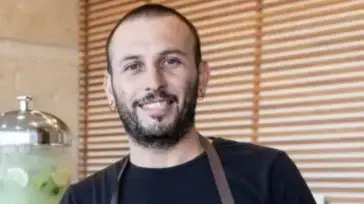We all know that person who from time to time asks: How are you?
And, without waiting for your answer —
spoiler
: he is not interested in anything — he continues talking about his own in his particular echo chamber.
“Enough talking about me, let's talk about you.
What do you think of me? ”, This is how the psychoanalyst Adriana Royo sums it up on her Instagram account.
We also tend to meet contemporaries on the networks who, from their sofas, feel challenged by a quote from, say, Julius Caesar, a Roman politician and soldier from the year I BC: "No one is so brave that they are not disturbed by something unexpected."
"Ooh!
It's so me! ”, comments the aforementioned without any shame.
There is no one else on the scene.
Only one person dances.
The rest are
props
.
We live convinced that we have narcissistic partners, friends, parents, bosses or children.
Without forcing the machine too much, they all fit the profile.
Probably us too.
In his book
The Weirdest People in the World
(Captain Swing, 2022), Joseph Henrich, head of the Department of Evolutionary Biology at Harvard University, describes WEIRD (weird) people.
An acronym that results from putting together these vital circumstances: raised in a western society (Western), with studies (Educated), industrialized (Industrialized), rich (Rich) and democratic (Democratic).
According to his theory, these people are "psychologically peculiar."
Namely: obsessed with their own self, and oriented to have everything under control.
Henrich describes them as individualistic and with "benign levels of narcissism."
Narcissistic disorder is more common in men, usually develops in adolescence and worsens over the years
After some time I meet a friend again.
In the first 10 minutes he asks me: "When we met, was there something in me that could indicate that I would reach a very high level in the world of music?"
He hadn't gotten that high either, but I said yes.
I swallowed dry.
I ordered another beer and didn't go into more detail.
Seriously, aren't we surrounded by narcissists?
According to statistics, narcissistic personality disorder is more common in men than in women (between 50% and 75% are male), it usually develops in adolescence or early youth and worsens over the years.
It is estimated that it affects 1% of the general population, in the United States some investigations speak of 6.2%.
A study conducted in Italy showed that 17% of first-year medical students had narcissistic personality traits.
In her book
The Selfishness of Others
(2016), Kristin Dombek describes “narciphobia” at length.
“Do you worry excessively about being surrounded by fake, empty people trying to manipulate you?
Do you think you should only associate with highly empathic people?”
If one answers affirmatively to these questions, they would suffer from narciphobia and would see narcissists even under stones.
I would go through life diagnosing and labeling everyone.
“It is a fear that distorts our relationship with others and leaves us frozen in victimhood,” says the author.
In his opinion, "a clinical term—narcissistic—has metastasized in our society to the point of serving to describe an entire culture."
Dombeck does not deny the existence of pathological narcissism, but he believes that the diagnosis has invaded dangerously too many spheres of life.
In her research, the writer plunged into the universe of
online
self-help , a "dark" place that Dombeck called the "narcissphere" where victims of alleged narcissists recount their experiences.
More information:
We are not as important as we think
Dombeck heard behaviors that seemed quite normal to her labeled as narcissistic, and she learned specific terms such as
love bombing
(the fireworks with which the narcissist makes you feel special), "being discarded" (when the narcissist loses interest and puts his attention on another victim), or “narcissistic fuel” (everything that fuels your behavior).
As we live in the confusion of who may or may not be a narcissist, we turn to the DSM5, the manual of the American Psychiatric Society that classifies mental disorders.
There, people with narcissistic personality disorder are described as an individual with “feelings of grandeur and arrogance, absorbed in their fantasies of success, power, brilliance, beauty (…).
You believe you are special and unique, and you can only be understood or can only associate with special or high-status people.
You have an excessive need for admiration and display a feeling of privilege.
He exploits interpersonal relationships (that is, he takes advantage of others for his own purposes).
He lacks empathy.
Often envies others or believes that they are envious of him.
Shows arrogant, superior behaviors or attitudes.”
"If we put several therapists to evaluate a suspected narcissist, each one will see something different, according to the authors and studies they have read," says Marta Carmona, psychiatrist and co-author, along with Javier Padilla, from
Malestamos
(Captain Swing , 2022).
Carmona explains that this concept is not made to label people, but to understand the context of a whole psychopathology.
“In mental health, diagnoses are classifications and everything is highly variable.
There is no material reality to examine as there is with pneumonia in a lung, the classifications are a pure diagnostic illusion, and when all this jumps into the
mainstream
it becomes impoverished and becomes a label, ”she adds.
Carmona refers to the Reddit forum.
“There any trace of malice, antipathy or inconvenience is identified as narcissism and that explains everything.
End of discussion.
It is a wild card as a few years ago was the term toxic”.
“If we put several therapists to evaluate a suspected narcissist, each one will see a different thing, according to the authors and studies they have read”
Marta Carmona, psychiatrist
Mariela Michelena is a therapist and psychoanalyst.
For her, narcissism is not a disorder.
“There is a primary narcissism that the mother gives away when she tells the baby that it is the best in the family.
It gives security, a place in the world, and protects from being a (secondary) narcissist in adult life.
That subject that seems to be overkill, but who constantly needs applause and external validation.
If you are a confident person, you can leave space for others and you don't have to be in a permanent advertising campaign”.
But isn't being in a constant campaign exactly what the market asks of us?
Don't we sign up for personal branding courses to be fine masters of self-promotion?
“Of course we will have to sell ourselves millions of times, creating a personal brand is something utilitarian, a tool, but one thing is that you sell the motorcycle to others and another that you also buy it”, says Michelena.
Those who say that we all suffer from low-key narcissism, adaptive to the circumstances that have touched us, may be somewhat right.
The British psychiatrist Sami Tamimi speaks of a social context that rewards narcissistic values and fascination with oneself.
“A society that encourages and trains individuals to create positive reinforcements that help them sell themselves, that praises individualism and penalizes interdependence because it is a sign of fragility.
That would be adaptive narcissism in the context of late capitalism.
It's healthy?
I would say no”, Carmona interjects.
The narcissistic, egotistical, evil, and manipulative pervert exists, but he's not around every corner or behind one in three Tinder profiles.
It was registered in 1986 by Paul-Claude Racamier, which he described as a set of symptoms that have not achieved a consensus in the scientific community.
Marta Carmona believes that knowing these extreme traits can be useful to identify patterns of abuse.
"But we're not surrounded by narcissistic perverts either," she warns.
The experts consulted like to talk more about narcissistic relationships.
“It may be that a person has committed narcissistic abuse in a relationship, but with another person they develop other dynamics.
You can't be diagnosing people lightly," says Carmona, adding that the most useful thing we can get out of this "fad" is to learn to detect patterns of temporary narcissistic abuse.
“We should be looking closely at the dynamics of a relationship, instead of labeling people,” she says.
Our jug narcissist may be empathic and wonderful with another person and in other circumstances.
You can follow
EL PAÍS Salud y Bienestar
on
,
and
.








/cloudfront-eu-central-1.images.arcpublishing.com/prisa/34VDHFBST5DFLDSXFEQEZRVRBI.jpg)
/cloudfront-eu-central-1.images.arcpublishing.com/prisa/HEVJXIXJ2FAB7HYVGJFYMJUCRI.jpg)